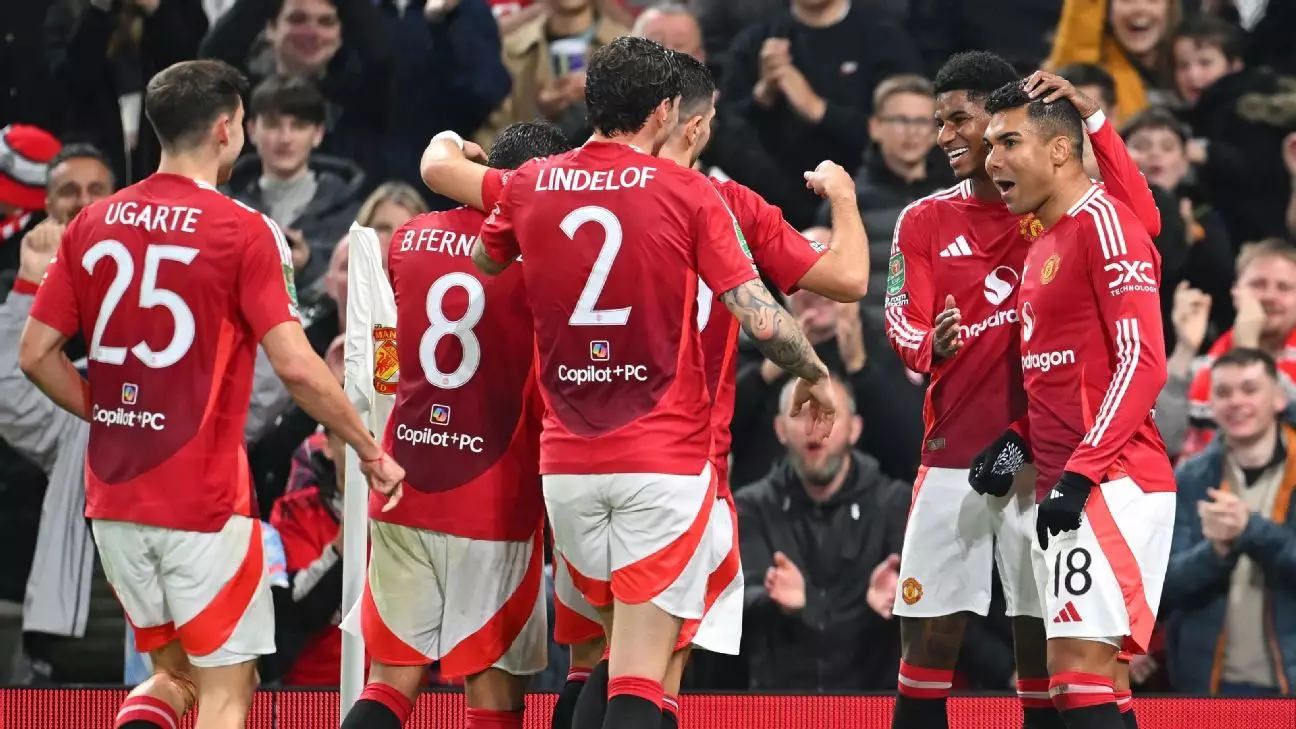Manchester United’s 5-2 victory against Leicester City in the Carabao Cup serves as a peculiar snapshot of a tumultuous season. Following the dismissal of Erik ten Hag, the team momentarily basked in the glow of what can only be described as a rarity this season—a comfortable win. Players celebrated by parading around Old Trafford, clapping fans and soaking in applause, perhaps sensing the need for validation in a dismal campaign. But while this victory brought short-lived joy to the surface, it does little to mask the deeper issues hovering ominously over the club.
Ruud van Nistelrooy, stepping in as interim manager, might have enlivened the team momentarily, yet the atmosphere remains charged with uncertainty. Remarkably, though victorious, Manchester United languishes in 14th place in the Premier League. Herein lies the irony: a win celebrated in a season where mediocrity has become the norm cannot be overlooked as a mere blip on the radar. The players, it appears, were craving a moment of glory, blissfully unaware—or perhaps ignoring—the broader context of a season marred by managerial turmoil and underperformance.
The recurring pattern of managerial turnover at Manchester United paints a grim picture. Van Nistelrooy becomes the ninth person to assume command at the club since Sir Alex Ferguson’s retirement in 2013. With each management change, a common theme emerges: teams often experience a transient surge in morale. However, these fleeting moments of success rarely translate into sustained improvement. History suggests that poor performances are cyclical, and the harsh truth is that players often bear significant responsibility for the failures of their past managers.
The coaching carousel has claimed numerous victims, with Ten Hag merely the latest to find himself on the chopping block after significant underperformance by the squad. The challenge ahead for his successor, Ruben Amorim, is steeped in unpredictability. Will he be able to instigate genuine change in a team that has failed to deliver consistently? The concerns for the new manager grow as players, despite occasional standout performances—the likes of Casemiro and Bruno Fernandes—continue to project inconsistency.
United’s victory at Old Trafford against a weakened Leicester side should not obscure the glaring challenges faced by the squad. Despite a couple of brightly shining individual performances, particularly from Casemiro, the defensive frailties resurfaced time and again—allowing the opposition to score twice and showcasing the recurring defensive lapses that have haunted the team throughout the season. The alignment of the squad remains unbalanced, and the weaknesses continue to be a source of concern.
Furthermore, the manner in which the team managed to concede goals against a Leicester side that wasn’t fully at strength raises an important question about the collective mentality and readiness to compete. Observing moments where players were easily dispossessed should have sent alarm bells ringing for Van Nistelrooy and indeed for Amorim, who will be scrutinizing game footage closely prior to his anticipated arrival.
Yes, the victory brought elation, but to assume it indicates a turning point would be misleading. The same personnel, the same formation that has repeatedly resulted in dismal performances were still on display, suggesting that no actual foundational changes have yet been initiated in response to the systemic issues plaguing the club.
As the team gears up for their next match against Chelsea, the question lingers: Can they maintain this newfound momentum? Perhaps they could clinch another victory, but the reality is that Amorim must proceed with caution when assessing the current squad. A win does not equate to a resurrection; it merely serves as a momentary pause in an ongoing crisis. The challenges for the incoming manager are immense, requiring an astute understanding of the players that can contribute positively and those who have overstayed their welcome.
As fans continue to see flashes of brilliance within individuals, the key will be whether these players can unite and bring forth sustained excellence. A mere instance of success does not compensate for the long-established shortcomings, and supporters should remain vigilant, understanding that genuine restructuring may be on the horizon, but it will take more than just isolated victories to warrant full-fledged optimism.
In the end, Manchester United’s 5-2 win might echo a hopeful cheer in the short term, yet the glaring shadows of inconsistency and managerial instability make it painfully clear: the club’s journey back to its former glory is fraught with challenges yet to be overcome.


Leave a Reply